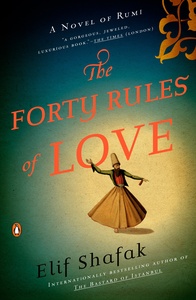You need to sign in or sign up before continuing.
Take a photo of a barcode or cover
A really wonderful book. As a Mount Holyoke student, I was excited when I read that Ella lives in Northampton, then beyond thrilled when her older daughter, the one who initially makes her rethink her ideas on love, is a Mount Holyoke student just like me! I read on Elif Şafak's Wikipedia page that she was a fellow at Mount Holyoke for a time- what an honor for my school to have hosted such a superb author.
Ella's daughter who goes to Mount Holyoke is named Jeannette. I imagine only Mount Holyoke students and faculty would catch this, but one of the most beloved historical Mount Holyoke figures is English professor Jeannette Marks. Marks met Mary Woolley as a college student in the late 1890s, and the two soon became lovers. When Mary Woolley moved to Mount Holyoke to serve as president in 1901, Marks followed. The two remained together until Woolley's death in 1947. Their love for each other in a time when that love was dangerous to both of them is still inspiring to Mount Holyoke students today.
In the book, Jeannette wants to marry her boyfriend, even though he's not Jewish and they're both 19. This disturbs her mother so much that Ella emails Aziz. I think if this book had been published in 2019 instead of 2009, Jeannette would have been a lesbian like her (possible) namesake.
Beyond the personal connection, I thought the descriptions of love and friendship in this book were inspiring. I loved reading it.
Ella's daughter who goes to Mount Holyoke is named Jeannette. I imagine only Mount Holyoke students and faculty would catch this, but one of the most beloved historical Mount Holyoke figures is English professor Jeannette Marks. Marks met Mary Woolley as a college student in the late 1890s, and the two soon became lovers. When Mary Woolley moved to Mount Holyoke to serve as president in 1901, Marks followed. The two remained together until Woolley's death in 1947. Their love for each other in a time when that love was dangerous to both of them is still inspiring to Mount Holyoke students today.
In the book, Jeannette wants to marry her boyfriend, even though he's not Jewish and they're both 19. This disturbs her mother so much that Ella emails Aziz. I think if this book had been published in 2019 instead of 2009, Jeannette would have been a lesbian like her (possible) namesake.
Beyond the personal connection, I thought the descriptions of love and friendship in this book were inspiring. I loved reading it.
emotional
hopeful
inspiring
reflective
medium-paced
Plot or Character Driven:
A mix
Strong character development:
Yes
Loveable characters:
Yes
Diverse cast of characters:
Yes
Flaws of characters a main focus:
Yes
informative
mysterious
reflective
relaxing
slow-paced
Plot or Character Driven:
Character
Strong character development:
Yes
Diverse cast of characters:
Yes
First time I've given 5 stars to a book on Goodreads, but it deserved every single one of the stars. I'm not going to review it. Shams would say if you understand it, you don't need my review, and if you don't, then this review won't help you anyway.
So what does a review matter? All that matters is love.
So what does a review matter? All that matters is love.
مؤثر, ملهم وممتع إلى أبعد الحدود.
بالرغم من بعض الاعتقادات الصوفية التي تسود على جو الكتاب إلا أنه جميل ومثير في كلا قصتيه اللتين تحدثان في عصرين ومكانين مختلفين.
بالرغم من بعض الاعتقادات الصوفية التي تسود على جو الكتاب إلا أنه جميل ومثير في كلا قصتيه اللتين تحدثان في عصرين ومكانين مختلفين.
hopeful
reflective
medium-paced
Plot or Character Driven:
A mix
Strong character development:
No
Loveable characters:
Complicated
Diverse cast of characters:
Yes
Flaws of characters a main focus:
Complicated
his was I think just not for me. I loved <i>The Island of Missing Trees</i> when I read it earlier this year and this had been highly recommended - and I just found it a bit of a slog.
The novel opens with Ella, a middle-aged woman whose married to a man who has been having affairs for years and is the mother to three children - one in college and two in high school. She's just got a job with a literary agent, introducing the split narrative - one that takes us back to the 1200s and the story of Rumi and Shams of Tabriz. We flick between the two stories as Ella also begins to form a relationship with Aziz, the author of the book she is reading.
Overall, this felt like quite a heavy handed introduction to Sufism and the titular Forty Rules - there are numerous moments where Shams will just announce 'that is one of the rules' and than recite it regardless of what might be going around him. The parallels between Ella and Aziz in the present and Rumi and Shams in the past also felt like being hit over the head as well. I found the historical storyline far more compelling, and Shafak really vividly created all of the places that Shams travelled through. However, the 1200s did feel very...modern, both in terms of outlook of the characters and the way that they spoke. I also felt like a ready we were supposed to be rooting for Rumi and Shams, but I found the latter in particular to be incredibly self-absorbed and certainly not someone I would dedicate my life to following.
I was a bit gutted after this experience - I think I do want to give Daughters of Eve a whirl, maybe Shafak's more religious-inspired novels just aren't for me.
The novel opens with Ella, a middle-aged woman whose married to a man who has been having affairs for years and is the mother to three children - one in college and two in high school. She's just got a job with a literary agent, introducing the split narrative - one that takes us back to the 1200s and the story of Rumi and Shams of Tabriz. We flick between the two stories as Ella also begins to form a relationship with Aziz, the author of the book she is reading.
Overall, this felt like quite a heavy handed introduction to Sufism and the titular Forty Rules - there are numerous moments where Shams will just announce 'that is one of the rules' and than recite it regardless of what might be going around him. The parallels between Ella and Aziz in the present and Rumi and Shams in the past also felt like being hit over the head as well. I found the historical storyline far more compelling, and Shafak really vividly created all of the places that Shams travelled through. However, the 1200s did feel very...modern, both in terms of outlook of the characters and the way that they spoke. I also felt like a ready we were supposed to be rooting for Rumi and Shams, but I found the latter in particular to be incredibly self-absorbed and certainly not someone I would dedicate my life to following.
I was a bit gutted after this experience - I think I do want to give Daughters of Eve a whirl, maybe Shafak's more religious-inspired novels just aren't for me.
inspiring
reflective
slow-paced
Plot or Character Driven:
A mix
Strong character development:
Yes
Loveable characters:
Yes
Diverse cast of characters:
Yes
Flaws of characters a main focus:
Complicated
"A life without love is of no account. Don't ask yourself what kind of love you should seek, spiritual or material, divine or mundane, Eastern or Western... Divisions only lead to more divisions. Love has no labels, no definitions. It is what it is, pure and simple. Love is the water of life. And a lover is a soul of fire! The universe turns differently when fire loves water."
The Forty Rules of Love by Elif Shafak is not only a book about love, but also about religion (Sufism). Even though I do not understand the intricacies of Islam and Sufism, I could still appreciate the culture in EF's words. The chapters that follow Rumi, Shams and the other characters' lives were full of life and love. The characters were written with love as we see how they lives intertwine and transform.
When I first started this book, I wasn't sure what I was getting myself into. This book is serious and is not for somebody who is looking for an enjoyable light hearted read. It might not be for everyone, but I enjoyed how the book switched between timelines. Unfortunately, I think I would have been able to appreciate this book better if I had more knowledge on the religion and the Qur'an as there were many references made.
There are many beautiful, reflective and inspiring quotes in this book. If you are a huge collector of quotes, this is definitely a book for you.
This book was recommended to me so long ago and I only just picked it up. After reading it, I know that this is one of those books that will stay with me for a long, long time. Before this book, I had only read the poems by Rumi. I barely knew about Shams of Tabriz, and the beautiful bond he shared with Rumi. Every single character in this book - no matter how small his/her role - was brought to life. I felt connected to each and every one of them. As for Shams of Tabriz - I found his character as the most beautiful and pure; his forty rules of love have left a deep impact on me. It changes the way I look at things, at the way I live my life. The prose was beautiful! There were so many lines that made me want to stop reading and stare at a wall.
Now that I have finished it, I want to go back and read it all over again. And lastly, I would really recommend this book to everyone.
Now that I have finished it, I want to go back and read it all over again. And lastly, I would really recommend this book to everyone.




